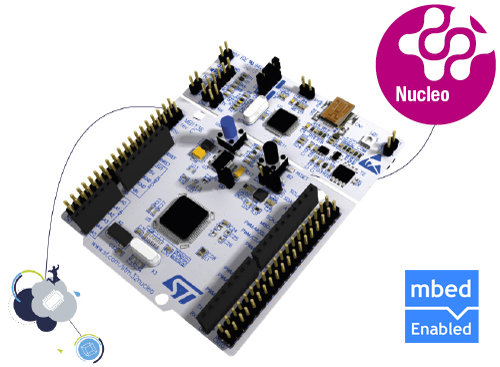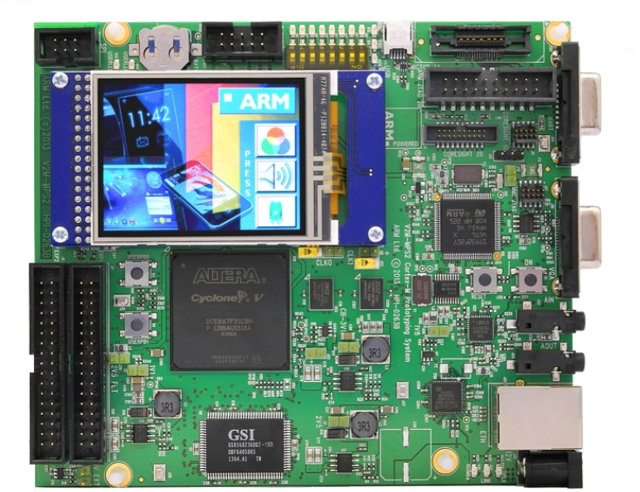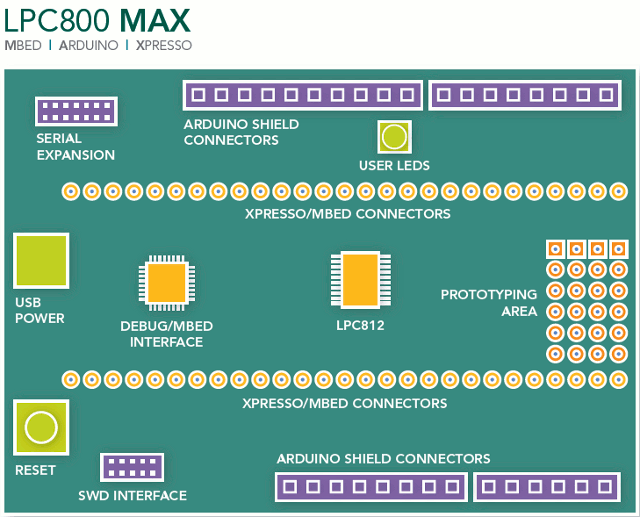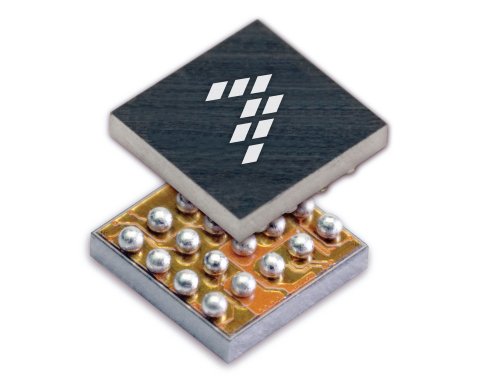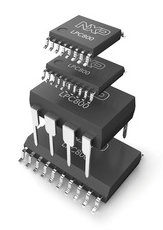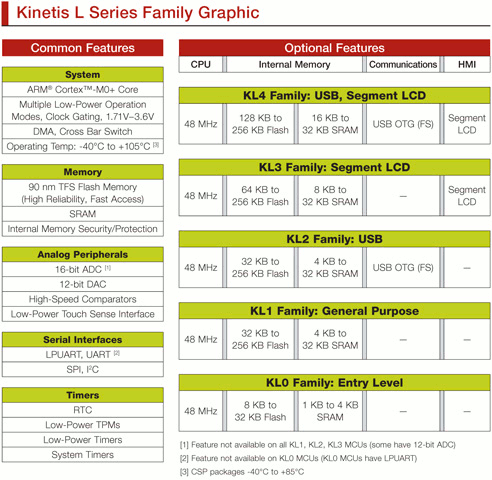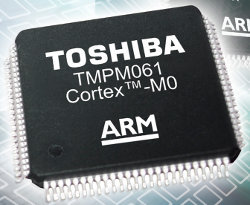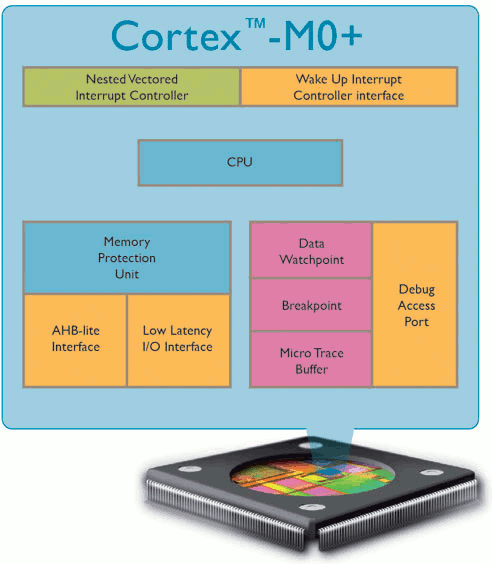STMicro already announced a $24 NFC development kit a few days ago, and they’ve now announced new ultra low cost STM32 development boards. STMicro Nucleo development boards are based on different STM32 MCU based on ARM Cortex M0, M3 and M4, feature Arduino headers, and are supported by mbed platform. There are currently four boards available: NUCLEO-F401RE – Based on STM32F401RET6 ARM Cortex M4 MCU @ 84 MHz with 512KB flash memory, 96 KB SRAM NUCLEO-F030R8 – Based on STM32F030R8T6 ARM Cortex M0 MCU @ 48 MHz with 64KB flash memory, 8KB SRAM NUCLEO-F103RB – Based on STM32F103RBT6 ARM Cortex M3 MCU @ with 128KB flash memory, 20 KB SRAM NUCLEO-L152RE – Based on STM32L152RET6 ARM Cortex M3 MCU @ 32MHz with 512KB flash memory, 32KB SRAM All four boards share the following specifications: STM32 microcontroller with LQFP64 package Two types of extension resources Arduino Uno Revision 3 connectivity STMicroelectronics […]
ARM Unveils Cortex-M Prototyping System Based on Altera Cyclone V FPGA
Before micro-controllers or processors are manufactured, simulation is performed in (usually) expensive boards based on FPGA chips from Altera or Xilinx, and once designers have found the system to work as expected, they can move to the next phase and work on the actual silicon. ARM has just released V2M-MPS2 Cortex-M Prototyping System for MCU / SoC / ASIC designers working on Cortex-M processors. Key features: Altera Cyclone V FPGA with ~150K LE 4x 2MB ZBTRAM (32-bit each, with two of them forming a 64-bit memory). ZBT = Zero Bus Latency 16MB PSRAM (16-bit) Touch screen LCD module Range of hardware interfaces – UART, VGA (4 bit per color), SPI, audio (I2S), Ethernet, LEDs, buttons I/O expansion ports (GPIO) FPGA images for Cortex-M processors Example project for Cortex-M0 DesignStart (processor IP has to be licensed separately) USB connection for downloading FPGA images and program image to micro SD card on board […]
NXP LPC800-MAX Development Board Combines mbed, LPCXpresso and Arduino Connectivity
NXP unveiled LPC810 & LPC812 Cortex M0+ MCUs in November 2012, and more recently at Embedded World 2013, the company announced LPC810 and LPC812 microcontrollers availability together with LPC800-MAX, a development board based on NXP LPC812 compatible with mbed, Arduino and LPCXpresso headers which will be released in April 2013. LPC800-MAX board features: MCU – LPC812 Cortex M0+ in TSSOP20 package Onchip memory – 4KB SRAM and 16KB Flash. On-board debug interface (mbed USB onboard interface) on a LPC11U35 Top of board has Arduino compatible connectors, bottom of board has mbed and LPCXpresso connectors. Routing configurable via Switch Matrix. 3 color user LED, same one as on the LPC800 Xpresso A PCF8591 I2C ADC, mainly intended for use with the Arduino connectors 14-pin Serial Expansion Interface Connector compatible with several expansion modules from Embedded Artists 10-pin SWD connector for optional external debug probe User prototyping area This USB powered board will […]
Freescale Unveils Kinetis KL02, an Ultra Small (1.9×2.0mm) ARM Cortex M0+ Microcontroller
Freescale Semiconductor introduced the Kinetis KL02, the world’s smallest ARM MCU, at Embedded World 2013. KL02 is an ARM Cortex M0+ micro-controller designed to address the miniaturization needs of the Internet of things, and its size (1.9×2.0mm) makes it suitable for applications such as ingestible healthcare sensing, portable consumer devices, remote sensing nodes, and wearable devices. Kinetis KL02 MCU features include: 48 MHz ARM Cortex-M0+ core, 1.71-3.6V operation Bit manipulation engine for faster, more code-efficient handling of peripheral registers 32 KB flash memory, 4 KB RAM High-speed 12-bit analog-to-digital converter High-speed analog comparator Low-power UART, SPI, 2x IICI2C Powerful timers for a broad range of applications including motor control Power Efficiency – 15.9 CM/mA (Coremark 1.0) -40 °C to +85 °C operation The MCU is manufactured using chip-scale package (CSP) technology that allows to connect the die directly to the solder ball interconnects and, in turn, to the printed […]
NXP Launches Cortex M0+ LPC800 MCU and $15 LPC812-LPCXpresso Board
Following ARM Cortex M0+ announcement in March 2012, NXP Semiconductors has just announced the LPC800, tiny 32-bit MCUs based on Cortex M0+ core @ 30 MHz designed to replace 8-bit MCUs, together with LPCXpresso development board for the LPC800. The MCUs come with 1 to 4KB SRAM, 4 to 16 KB Flash, several serial interfaces and are available in SO20, TSSOP20, TSSOP16 and even DIP8 packages. Here are the key features of NXP new ultra low power 32-bit MCU family: ARM Cortex-M0+processor up to 30 MHz, software compatible with Cortex M0, M3 and M4 cores Memories: 4 to 16 kB Flash (with 64 Byte page size) 1 to 4 kB SRAM Serial Peripherals: Up to 3 USART interfaces Up to 2 SPI controllers 1x I2C-bus interface Timers: Multiple-channel multi-rate timer (MRT) State Configurable Timer (SCT) Self Wake-up Timer (WKT) clocked from either the IRC or a low-power clock source Windowed […]
Freescale Announces Availability of Kinetis L Series Cortex M0+ MCU and Freedom Devkit
ARM unveiled its ultra-low power Cortex-M0+ core back in March, and Freescale and NXP also announced their plans to use this new core in some of their micro-controllers destined to power the internet of things. Yesterday at Freescale Technology Forum (FTF), Freescale announced the availability of alpha samples of its Kinetis L series. This new low power MCU family will allow existing 8-bit and 16-bit architecture to be replaced by 32-bit architecture without increasing power consumption, cost or size, and the company expects them to be used in devices such as small appliances, gaming accessories, portable medical systems, audio systems, smart meters, lighting and power control. The ARM Cortex-M0+ processor is said to consume about a third of the energy of any 8- or 16-bit processor, while delivering between two to 40 times more performance. Kinetis L series MCU can consume as low as 50 uA/MHz in very-low-power run (VLPR) […]
Toshiba Unveils TMPM061 Cortex-M0 MCU for Smart Meters
Toshiba America Electronic Components (TAEC) has announced the TMPM061, a new 32-bit ARM Cortex-M0 MCU specifically designed for smart metering applications. This new micro-controller provides a single chip solution for smart meters, eliminating the need for the two-chip approach with an analog front end (AFE) and a MCU, delivering a smaller footprint and lower costs. In order to simplify smart meter power measurement, the TMPM061 features an onboard power calculation engine that can calculate active energy, reactive energy and power factor as well as monitoring voltage and frequency fluctuation. In addition, the TMPM061 features up to 128KB on-chip Flash ROM and 8KB on-chip RAM, as well as on-board peripherals including: 3-channel 24-bit Delta-Sigma analog-to-digital converter (ADC) supporting sampling up to 6 kHz 10-bit ADC Temperature-compensated real-time clock (RTC). 9-channel 16-bit timer LCD display controller Temperature sensor Voltage detection circuit Watchdog timer 5-channel general-purpose serial interface Serial bus interface (I2C bus mode or […]
ARM Announces ARM Cortex-M0+ Core to Power the Internet of Things
ARM has just unveiled the ARM Cortex-M0+ 32-bit processor optimized to deliver ultra low-power and low-cost MCUs to power the ‘Internet of Things‘ by controlling connected intelligent sensors and smart control systems in a broad range of applications including home appliances, white goods, medical monitoring, metering, lighting and power and motor control devices. ARM claims the Cortex-M0+ consumes just 9µA/MHz on a low-cost 90nm LP process, around one third of the energy of any 8- or 16-bit processor available today, while delivering significantly higher performance (1.77 CoreMark/MHz). Beside the low power consumption, the main advantage of the Cortex-Mo+ over 8-bit and 16-bit MCUs , is that it can provide low power wireless connectivity to a variety of embedded systems such as wireless sensors. The new processor is based on Cortex-M0 processor but has been redesigned to include a few new features such as: Single-cycle IO to speed access to GPIO […]


